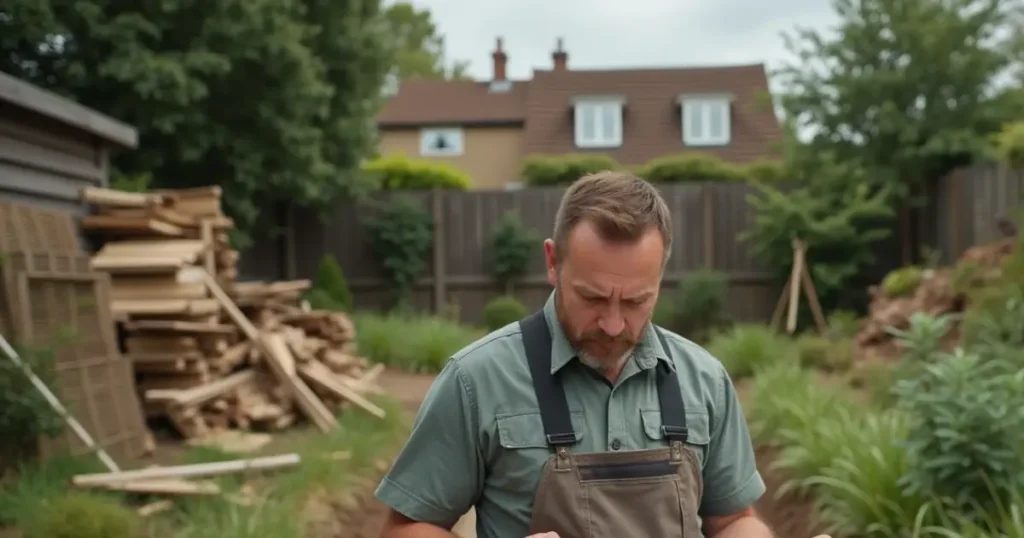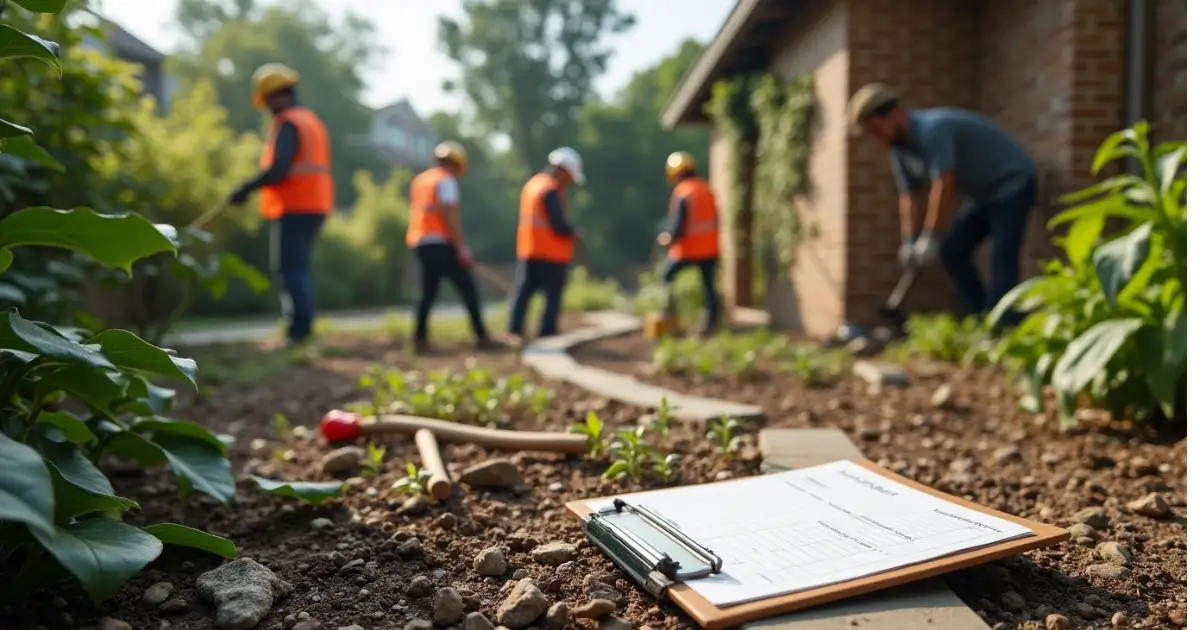Success in landscaping isn’t just about cutting grass or planting trees—it’s about cutting through the noise of competition and planting the seeds of sustainable growth. The challenges are real: fierce competition, seasonal slumps, and the constant battle to balance creativity with profitability.
But here’s the good news: failure isn’t inevitable. In this article, we’re diving deep into why so many Landscaping Businesses Fail and, more importantly, how you can avoid becoming another statistic. Whether you’re just starting or looking to level up your existing business, you’ll find clear, actionable strategies to overcome the pitfalls and pave the way for lasting success. Let’s dig in!
Table of Contents
The High Failure Rate of Landscaping Businesses
The landscaping industry promises lush profits, but the reality is often far from rosy. While it’s true that the demand for landscaping services is growing, the competition is fierce, and the failure rate is sobering. Forbes reports that 80% of small businesses fail within the first 18 months, and landscaping is no exception. Even more striking, only 15% of small businesses make it past their fifth year. The Small Business Administration ranks construction—closely tied to landscaping—as the second riskiest business sector.
Why is failure so common? Missteps often stem from a dangerous mix of overconfidence and underpreparedness. Many new business owners underestimate the challenges, assuming landscaping is as simple as “cutting grass, collecting checks, and making bank.” However, running a successful landscaping business takes more than great lawn care skills. It demands financial planning, strategic decision-making, and a clear vision for growth—areas where many fall short.
Here’s a snapshot of the most common pitfalls:
- Treating the business like a job rather than an enterprise.
- Starting with significant debt and no safety net.
- Lacking a business plan—90% of companies fail to create one.
- Underestimating the competition and being undercut on pricing.
- Being a skilled landscaper but lacking business acumen.
Understanding these challenges isn’t just important—it’s essential. When you know where others stumble, you can map a clearer path to success. Let’s explore how to sidestep these pitfalls and build a flourishing landscaping business.
Common Pitfalls That Sink Landscaping Businesses
Running a landscaping business might seem straightforward, but hidden challenges can derail even the most passionate entrepreneurs. From underpricing to burnout, the road to success is littered with pitfalls that often go unnoticed until it’s too late. Let’s break down the most common mistakes—and how to avoid them.
Lack of Business Knowledge and Planning

Passion alone won’t sustain a business. Many landscapers dive in without a solid business plan or understanding of basic principles like pricing, budgeting, and growth strategies. This often leads to reactive decision-making rather than proactive problem-solving. A clear business plan, including goals, financial forecasts, and marketing strategies, isn’t just helpful—it’s essential. Without it, you’re navigating blind.
Actionable Tip: Before starting or scaling your business, create a comprehensive business plan. Utilize frameworks like SWOT analysis to evaluate your business’s Strengths, Weaknesses, Opportunities, and Threats, helping you pinpoint potential risks and areas for growth.
Misjudging Project Needs
Underestimating what a project requires can spiral into cost overruns and missed deadlines. Misjudging how much material is needed, underestimating labor hours, or failing to account for unexpected challenges—like bad weather or site issues—can quickly frustrate clients and hurt your reputation.
Actionable Tip: Spend time upfront assessing each project. Create detailed estimates for materials, labor, and equipment usage. Always add a buffer for unexpected challenges.
Equipment Timing and Mismanagement
Owning expensive equipment that sits idle or renting tools at the wrong time can eat into profits. For example, renting a trencher during the offseason may seem affordable, but if it’s underutilized, you’re wasting money. Similarly, owning equipment without a maintenance plan can lead to breakdowns and costly repairs.
Actionable Tip: Evaluate your equipment needs seasonally. Lease or rent high-cost machinery only when projects justify it. If you own equipment, schedule regular maintenance to maximize its lifespan.
Financial Mismanagement
Even a thriving business can fail if the finances aren’t in order. Common mistakes include underpricing services, failing to track expenses accurately, and neglecting cash flow management. Without a clear view of your financial health, it’s easy to overextend and end up in debt.
Actionable Tip: Use accounting software to monitor income, expenses, and cash flow. Regularly review your financials to identify trends and adjust your pricing or spending habits accordingly.
Operational Inefficiencies
A disorganized business bleeds time and money. Poorly scheduled jobs, untrained staff, and inconsistent processes lead to delays, lower productivity, and frustrated employees and clients.
Actionable Tip: Implement scheduling software to organize jobs efficiently. Create a training program for staff to ensure consistency in quality and customer service.
You can also read: How to Start Your Profitable Pressure Washing Business in 2025
Underpricing and Bidding Errors
Setting prices too low to win contracts might fill your schedule, but it can quickly turn into a nightmare. Thin profit margins mean you’re one unexpected expense away from financial trouble. Additionally, bidding mistakes, such as failing to account for labor or material costs, leave you working for less—or even at a loss.
Actionable Tip: Research your market to understand competitive pricing, and ensure your rates reflect your expertise and costs. Include a profit margin in every bid to safeguard against unexpected expenses.
Weak Marketing Strategies
A lack of marketing leaves many landscaping businesses struggling to find clients. In today’s digital world, an outdated website, a sparse social media presence, or weak branding can make you nearly invisible to potential customers.
Actionable Tip: Invest in building a professional website and optimize it for local SEO (search engine optimization). Use social media to showcase your work and connect with potential clients.
Inconsistent Quality and Service
Reputation is everything in the landscaping business. A single unhappy client can lead to negative reviews, word-of-mouth complaints, and lost opportunities. Delivering inconsistent quality or failing to communicate effectively with clients undermines trust.
Actionable Tip: Develop quality control processes to ensure every project meets your standards. Regularly check in with clients to address concerns and maintain satisfaction.
Overexpansion Without a Plan
Growing your business too quickly can feel exciting, but it often leads to chaos. Without the systems, staff, and resources to handle the increased workload, quality and efficiency suffer. This, in turn, leads to dissatisfied clients and financial strain.
Actionable Tip: Expand gradually. Before taking on more projects, ensure you have the necessary infrastructure, such as trained staff, reliable equipment, and efficient systems.
Personal Burnout

Landscaping is physically demanding and time-intensive. Many business owners take on too much, working long hours without breaks. Over time, this leads to burnout, which can affect your decision-making, health, and overall business performance.
Actionable Tip: Prioritize self-care and work-life balance. Delegate tasks when possible, and schedule regular time off to recharge.
How to Beat the Odds and Build a Successful Landscaping Business
Success in the landscaping industry doesn’t happen by chance—it’s the result of careful planning, smart decisions, and relentless focus. With so many businesses failing to get off the ground, how can you rise above the competition and thrive? Here’s how to beat the odds and create a landscaping business that stands the test of time.
Develop a Solid Business Plan
A strong foundation begins with a clear, actionable business plan. Your plan should outline your goals, target market, pricing strategy, operational processes, and growth objectives. It’s not enough to create a plan and forget it—regularly review and update it to adapt to market changes and new opportunities.
Why it matters: A business plan isn’t just a document; it’s your roadmap to success. It keeps you focused, helps you secure funding, and ensures every decision aligns with your long-term vision.
Pro Tip: Include contingency plans to handle unexpected challenges, such as economic downturns or shifts in customer demand.
Master Financial Management
One of the most common reasons landscaping businesses fail is poor financial management. Implement robust tracking systems to monitor expenses, revenue, and cash flow. If needed, consult with a financial advisor to ensure your pricing covers costs and leaves room for profit. Set aside funds for emergencies and avoid unnecessary debt.
Why it matters: Staying on top of your finances prevents cash flow crises and keeps your business running smoothly, even during slow seasons.
Pro Tip: Use accounting software like QuickBooks or FreshBooks to automate financial tracking and generate detailed reports.
You can also read: Mobile Car Wash Business: Your Complete 2025 Blueprint for Success
Invest in Effective Marketing and Networking
Your business won’t grow if people don’t know about it. Build a professional website that showcases your services, testimonials, and past projects. Optimize it for local SEO to attract nearby customers searching for landscaping services. Stay active on social media to share updates and connect with your audience.
Why it matters: Effective marketing and networking establish your presence, attract clients, and position your business as a trusted name in the industry.
Pro Tip: Encourage satisfied clients to leave online reviews. Positive feedback on platforms like Google and Yelp can significantly boost your credibility.
Prioritize Quality Workmanship and Customer Satisfaction
Quality is your best marketing tool. Ensure every project reflects high standards of workmanship, and don’t hesitate to go the extra mile for clients. Solicit feedback after each job, address concerns promptly, and look for ways to improve. Happy clients are more likely to recommend your business and provide repeat work.
Why it matters: Consistent quality builds trust and a strong reputation, which are crucial for long-term success.
Pro Tip: Develop a checklist for each project to ensure no detail is overlooked and expectations are always met.
Choose the Right Equipment: Buy vs. Rent
Owning equipment can save money over time, but it’s not always the best option. Analyze your business needs to determine what makes sense to purchase and what’s better to rent. For frequently used tools like mowers or trimmers, ownership is cost-effective. For infrequent or seasonal needs, renting can save you significant upfront costs.
Why it matters: Proper equipment management reduces unnecessary expenses and ensures you always have the right tools for the job.
Pro Tip: Track equipment usage to evaluate cost-effectiveness and plan maintenance schedules to extend the life of owned tools.
Build a Strong Team and Delegate Responsibilities
No successful business thrives on the efforts of one person. Hire skilled employees who share your commitment to quality and invest in their training. Delegate tasks to trusted team members so you can focus on strategic decisions and growth.
Why it matters: A strong team allows you to scale operations without sacrificing quality or burning out.
Pro Tip: Create clear roles and responsibilities for each team member and hold regular meetings to align on goals and expectations.
Embrace Technology and Automation
In today’s competitive market, technology has shifted from being a convenience to an essential tool for success. Use landscaping business software to streamline scheduling, invoicing, and client communication. Tools like GPS trackers, project management apps, and automated reminders can boost efficiency and reduce errors.
Why it matters: Automation saves time, reduces manual work, and helps you deliver a seamless experience for your clients.
Pro Tip: Experiment with drone technology for site surveys and 3D modeling software for landscaping designs to stand out from competitors.
Avoid Overexpansion: Grow Strategically
Expanding too quickly can strain your resources and compromise quality. Instead, focus on strategic growth. Before adding new services or entering new markets, assess whether you have the necessary staff, equipment, and systems in place.
Why it matters: Growing strategically ensures you can maintain quality and profitability as your business scales.
Pro Tip: Start small when testing new services, and gather client feedback to refine your offerings before rolling them out widely.
Maintain Work-Life Balance and Prevent Burnout
The landscaping industry demands long hours and physical labor, but overworking yourself isn’t sustainable. Schedule regular breaks, set boundaries between work and personal time, and prioritize activities that help you recharge.
Why it matters: A healthy, motivated owner is essential for a thriving business. Burnout affects not only your health but also your ability to make sound decisions.
Pro Tip: Delegate non-core tasks like bookkeeping or social media management to free up your time for high-impact activities—and rest.
By focusing on these strategies, you’ll be better equipped to overcome challenges, stand out in a competitive market, and build a landscaping business that doesn’t just survive—but thrives.
Conclusion: Your Landscaping Business Can Thrive
While the failure rate of landscaping businesses may be high, understanding the common pitfalls and implementing effective strategies can set you up for success. By focusing on careful planning, financial management, marketing, and customer satisfaction, you can build a resilient and thriving landscaping business.
Take the first step today by evaluating your business plan and identifying areas for improvement. With the right approach, your landscaping business can not only survive but thrive in this competitive industry.
To discover more business ideas and success stories and tips, visit our Success section.

